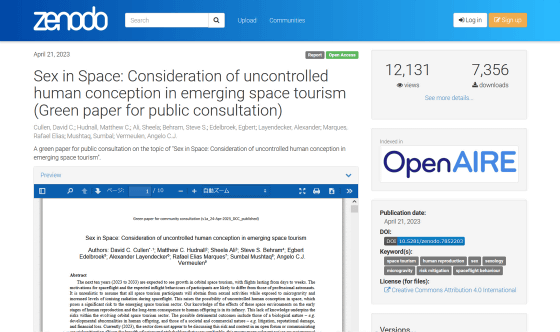Researchers point out that the space travel industry is not responding to ``sex in space'', and the possibility that someone will have sex in space within 10 years

Space development by private companies has made great progress in recent years, and in 2021
Sex in Space: Consideration of uncontrolled human conception in emerging space tourism (Green paper for public consultation) | Zenodo
https://zenodo.org/record/7852203

Sex in space: why it's worrying that the space tourism sector hasn't considered the consequences
https://theconversation.com/sex-in-space-why-its-worrying-that-the-space-tourism-sector-hasnt-considered-the-consequences-205770
``The story of space travel has always been in the distant future, but suborbital space travel (a few minutes of space flight and a short flight that includes zero gravity) already exists,'' Karen said, pointing out that long-term space travel is imminent. Japanese billionaire Yusaku Maezawa has already purchased tickets for SpaceX's orbital trip to the moon, and an eight-person crew has also been announced .
Just because space travel has become familiar, it may be difficult to imagine that sex in space will take place soon. However, humans are creatures who want to have sex even in very extreme environments, as there is a word ' mile high club ' that refers to a person who has had sex on an airplane. In the type of space travel that circumnavigates the earth and the moon, passengers stay much longer than airplane flights, so if you have the chance, you can avoid the public eye and have sex.
For long-term commercial space travel, spacecraft are equipped with large cabins, including passenger compartments, which can accommodate dozens of passengers. ``Given factors such as space travel is no longer just for professional astronauts, the various motivations of space travelers, and future spacecraft development, we have sex in space in the next decade.

``The real concern is not sex itself, but whether sex leads to human pregnancy in outer space,'' Karen said. Early space orbital trips are expected to last days to weeks, so only the early stages of human reproduction can occur in space.
Although the space travel industry does not allow people who are pregnant to board, it is possible that passengers may hide their pregnancy on board, or may not realize they are pregnant until later in their pregnancy. Long-term research has shown that staying in outer space affects the human body such as ``
A 2020 study examining the effects of cosmic rays on mouse embryos suggested that exposure to cosmic rays damages the embryos. Whether this is replicated in human reproduction is unknown, but we can expect it to have some effect.
Karen points out that the possibility of developmental abnormalities occurring in human embryos pregnant in space is unknown, and the risk of ectopic pregnancy (embryos attaching to the outside of the uterus, such as the fallopian tubes) in weightlessness may increase. We also don't know if space travelers will use contraception when they have sex, but it will work the same way in space as it does on Earth.

As mentioned above, there is a ``risk of passengers having sex in outer space'' in commercial space travel. However, the space travel industry is not prepared for the risks of lawsuits, reputational damage, economic losses, and ethical and reproductive rights debates if passengers become pregnant during space travel. In addition, in situations where multiple people live together in a closed space like a spaceship, the risk of sexual assault occurring in an environment with no escape increases.
“The space travel industry and other stakeholders should now come together to discuss these issues and develop strategies to protect everyone involved,” Cullen said. “A simple solution could be to provide pre-counseling to all space travelers about the risks of pregnancy in space. There could also be legal waivers that exempt space travel operators from liability should a pregnancy occur. It's going to happen. The question is whether the industry is prepared for the possible outcome.'
Related Posts:
in Science, Posted by log1h_ik







